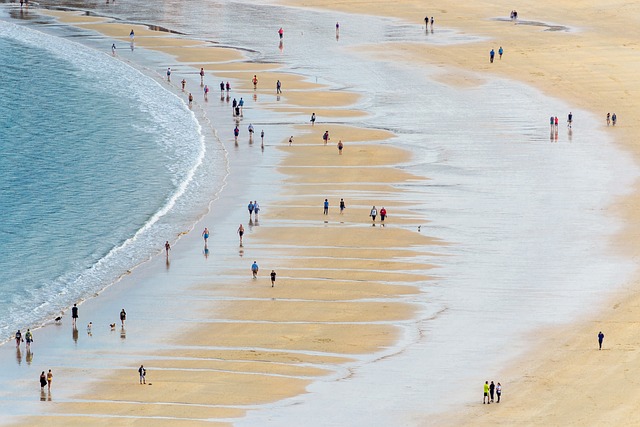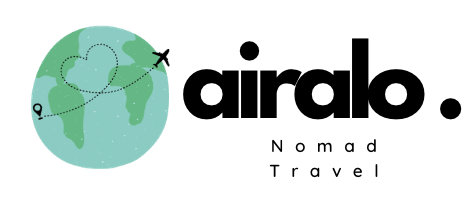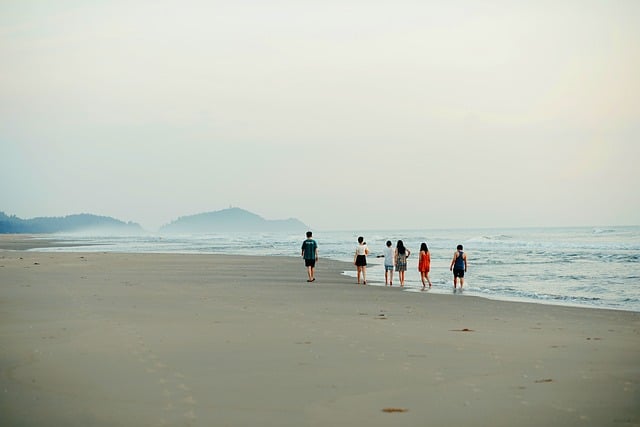
As the global population of digital nomads grows, more and more accommodation options are becoming available. Particularly in tourist hotspots and remote work-friendly areas, Nomad hotels, hostels and beach clubs have become a top choice for digital nomads, backpackers and long-term travelers. They not only provide accommodation, but also create a social and lifestyle experience that allows life and work to be seamlessly connected. This article will explore in detail the characteristics, advantages and challenges of these three forms of accommodation to help digital nomads make more appropriate decisions when choosing accommodation.
Nomadic Hotel: the perfect combination of flexibility and convenience
What is Nomad Hotel?
Nomadic Hotels is an innovative form of accommodation designed for digital nomads and long-term travelers. These hotels cater to travelers who need to work on-the-go and remotely by offering flexible accommodation options, modern amenities and spaces designed specifically for work needs. Compared with traditional hotels, Nomad Hotels pays more attention to providing guests with a comprehensive and adaptable living and working environment.
Rooms in nomadic hotels are often multi-functional in design, focusing on efficient use of space. They can not only be used as accommodation spaces, but also provide comfortable places for work. The public areas in the hotel focus more on social networking and networking. The design incorporates co-working spaces, social lounge areas and regular social activities to promote interaction and cooperation among guests.
Core Features of Nomadic Hotels
- Flexibility and variety of accommodation options
- Pay-as-you-go billing: Nomad hotel accommodations often offer hourly, daily, weekly or monthly rates, making them ideal for digital nomads who need to adjust their itinerary at any time. Guests can flexibly choose the length of stay according to their work progress and itinerary, avoiding the trouble of fixed time limits.
- Check-in and check-out anytime: Many nomadic hotels provide simplified reservation processes and support self-service check-in and check-out. Guests do not need to go through complicated procedures, reducing unnecessary waiting time and increasing their freedom.
- modern working facilities
- High-speed Wi-Fi and shared office space: Nomad Hotel provides ultra-high-speed Internet for digital nomads, ensuring that guests’ network needs, whether for video conferencing, cloud storage or daily work, are met. In addition, hotels also provide fully equipped coworking spaces, which are usually equipped with modern desks, comfortable chairs, power sockets and other equipment, and are suitable for long periods of concentrated work.
- Soundproofing and Privacy: For guests who need to work quietly, Nomad Hotels often provide soundproofed private work spaces or phone booths to avoid noise interference and ensure efficient work.
- Social environment and community atmosphere
- Social seating areas and interactive spaces: In addition to work spaces, nomadic hotels also have carefully designed social lounge areas, which are usually equipped with comfortable sofas, coffee bars, shared kitchens and other facilities, where guests can easily communicate with other digital nomads and expand their professional networks. The hotel often holds regular activities, such as social evenings, skill sharing, workshops, etc., to promote interaction and cooperation among guests.
- Cross-cultural exchange opportunities: Nomad Hotel attracts digital nomads from all over the world, which provides guests with a platform for cross-cultural exchange. By interacting with travelers from different countries and industries, residents can broaden their horizons, connect with like-minded people, and gain inspiration for professional and personal development.
- Intelligence and sustainability
- Smart home system: Rooms in Nomadic hotels are usually equipped with smart home devices, such as smart lighting adjustments, voice assistants, automatic temperature control systems, etc. Guests can easily control various facilities in the room through voice or mobile APP to enhance their living experience.
- Sustainable design: Many nomadic hotels pay attention to green environmental protection and adopt measures such as energy-saving lamps, environmentally friendly materials, and recycled water resources, which not only reduce the impact on the environment, but also provide guests with a healthier living environment.
Comparison with traditional hotels
| Features | Nomad Hotel | traditional hotel |
| flexibility | Provide flexible short-term and long-term billing options, choose the length of stay as needed, and easily adjust the plan | Most are charged on a daily basis, with fixed check-in times and little flexibility. |
| work facilities | High-speed Wi-Fi, coworking spaces, conference rooms, and phone booths designed for remote working | Mainly provides accommodation, usually without dedicated work area |
| social atmosphere | Provide social activities and public spaces to promote interaction and network building among residents | Focus more on private space and less social activities |
| Facilities | Focus on intelligent and green design to support long-term working and living | Focus on traditional entertainment facilities, such as swimming pools, gyms, etc. |
Advantages of Nomadic Hotel
- High flexibility to meet a variety of needs
- We provide flexible accommodation plans priced by the hour, day, week, and month to adapt to different travel plans and work rhythms. Digital nomads don’t need to worry about a fixed check-in date and can extend or shorten their stay at any time according to their needs.
- Some nomadic hotels also support flexible check-out times, allowing guests to choose the most appropriate check-out time based on actual needs, avoiding the strict 12 o’clock check-out time of traditional hotels.
- Comprehensive work support to improve work efficiency
- High-speed and stable Internet and professional shared office spaces can provide digital nomads with a distraction-free work environment. Shared office spaces usually have printers, scanners, conference equipment, etc. to meet the various resources required for daily work.
- Meeting rooms, phone booths and other facilities provide privacy protection and a quiet working environment for residents who need to conduct business negotiations or important conference calls.
- Unique social experience, build global network
- Nomadic Hotel breaks down the barriers between guests by organizing social activities, such as themed evenings, skill exchanges, language exchange courses, etc., helping guests meet people from all over the world and expand their professional networks.
- Residents can easily interact with other digital nomads in public areas such as kitchens and lounges to share travel experiences, work insights, and even career opportunities.
Nomadic Hotel Challenge
- high cost
- Nomad hotels tend to be more expensive, especially in popular cities or tourist destinations. Some nomadic hotels can be 50%-100% more expensive than regular hotels, and longer stays are also more expensive, which can be a burden for digital nomads with limited budgets.
- Small space, may not be suitable for long-term living
- While Nomad Hotels is designed with a focus on the versatility of space, some rooms, especially those that are billed by the hour, are smaller and more compact. For guests requiring more personal space, multiple luggage, or traveling as a family, additional considerations may be required for suitability.
- Service area is limited
- Nomadic hotels are currently concentrated in some big cities and popular tourist locations. Although the number of hotels in some cities is gradually increasing, there are still fewer choices for digital nomads living in more remote or niche areas.
How to choose the right Nomad Hotel?
- Clarify accommodation needs
- If you plan to stay for a long time, choose nomadic hotels that offer monthly rental discounts and larger rooms to ensure a comfortable living and working environment. For a short stay, you can choose a hotel that charges by the hour or day for a flexible stay.
- Compare prices and facilities
- Compare the prices and work facilities offered by different hotels to make sure the Internet speed, shared office space and meeting facilities of the hotel you choose can meet your work needs.
- Learn about the hotel’s social events schedule
- If you’re looking to build a global network while traveling, choose nomadic hotels that offer plenty of social activities. Not only do these events help you meet like-minded people, they also enhance your job opportunities in different fields.
Hostels: Affordable Social Haven
Concepts and features
Hostels have long been the preferred form of accommodation for budget travelers, backpackers, and digital nomads. Compared with traditional hotels, hostels have more simple accommodations, but their greatest features are rich social functions and community atmosphere. As modern hostels gradually improve their facilities and services, in addition to providing basic beds and accommodation, many hostels are also equipped with dedicated work areas, kitchens, social lounge areas, and regularly host various activities, especially for digital people who like to interact with others. homeless.
Hostel accommodation usually consists of dormitory rooms with shared beds, but individual private rooms are also available. This flexible accommodation option allows the hostel to cater to travelers with different budgets and needs, whether they are backpackers on a short-term stay or digital nomads on long-term trips or working remotely. The low prices of hostels make them ideal for long-term travelers, especially for digital nomads who want to save money on accommodation while enjoying the convenience of socializing and working.
Key features of the hostel
- Flexible accommodation and low prices
- Bed-share dormitories and private rooms: Hostels often offer bed-share dormitory rooms, which are an affordable way to stay while still allowing you to socialize and interact with other travelers. At the same time, many hostels also offer private rooms for those who wish to maintain a certain degree of privacy. This flexible option allows the hostel to serve travelers with different budgets and needs.
- Affordable price: Compared to hotels, hostels are often much cheaper than traditional forms of accommodation. For digital nomads on a budget, hostels offer an affordable accommodation option, especially for long-term stays.
- strong social atmosphere
- Group activities and social gatherings: Modern hotels focus on social interaction and interaction, and often hold parties, bar activities, cultural experience activities, etc. These events are not only part of the fun, but also a great opportunity to meet travelers and remote workers from around the world. Whether it’s a simple dinner party or a weekend city exploration, the hostel provides residents with a wealth of social interaction scenarios.
- Shared areas and a sense of community: Hostels usually have facilities such as shared kitchens, public lounge areas, and game rooms. Guests can communicate with each other and share travel experiences and even work experiences in these public spaces. In these shared spaces, digital nomads can not only make friends, but also find partners and expand their professional networks.
- Workspace and amenities
- Featuring workspace: As remote working becomes a popular trend, many modern hostels are starting to incorporate dedicated workspaces into their facilities. These workspaces often include long tables, outlets, good lighting, and high-speed internet, suitable for digital nomads to carry out their daily work tasks.
- Kitchen and self-catering facilities: The shared kitchen is a major feature of the hostel. Guests can prepare their own meals, which not only saves food costs, but also allows them to share the joy of cooking with other travelers. In addition, some hostels also provide free tea and coffee, so guests can rest and chat in a leisurely atmosphere.
Comparison with hotels
| Features | Hostels | Hotels |
| Accommodation form | Bed sharing dormitory or private room, flexible choice | Standard single rooms, double rooms, relatively fixed accommodation forms |
| price | Relatively inexpensive and suitable for travelers on a budget | Usually more expensive, suitable for more comfortable accommodation needs |
| social atmosphere | Strong social interaction, providing a variety of social activities and group gatherings | The social function is weak and mainly provides privacy space |
| work facilities | Provides shared workspaces for digital nomads | Offers a business center or conference room, but generally does not have a dedicated work space |
| Privacy | Less privacy, especially in shared dormitories | Provides better privacy protection, suitable for people who need a quiet and private environment |
Advantages of the hostel
- Affordable for digital nomads on a budget
- Hostels cost far less than hotels, making them ideal for budget travelers and digital nomads. For long-term travelers, hostels can help save a lot of money on lodging, especially for remote workers who need low-cost accommodation.
- Not only that, many hostels also offer discounts and membership benefits, so long-term guests can enjoy more favorable prices, further reducing accommodation costs.
- A strong social atmosphere that helps you meet travelers from around the world
- Hostels provide a place for digital nomads to mingle with other remote workers. By interacting with people from all over the world, residents not only learn about different cultures and lifestyles, but also establish cross-border social circles and collaboration opportunities. Social activities such as regular events, parties and city explorations enhance the hostel’s sense of community and provide further social opportunities.
- Shared facilities improve socializing and productivity
- Shared kitchens and common lounge areas allow residents to enjoy a welcoming social space while saving money. The shared workspace designed specifically for work provides a centralized working environment for digital nomads, where residents can work with others, encourage and support each other, and increase work motivation and efficiency.
Hostel Challenge
- Lack of privacy, which may interfere with focused work
- When choosing shared dormitories, there is often less privacy, and residents need to share bathrooms and lounge areas with others. For digital nomads who need quiet and private space, this may affect their quality of life and productivity. Although some hostels offer individual private rooms, these are usually more expensive.
- The facilities are relatively simple and cannot meet high-end needs.
- Compared to nomadic hotels, hostel facilities may be more basic, especially in some of the more traditional hostels. Wi-Fi speed and stability may not be as good as those in professional coworking spaces, and the workspace equipment, tables and chairs in some hostels are not comfortable and modern enough. For those digital nomads who have high requirements for a working environment, they may need to find another suitable workplace.
- Noise and clutter can impact productivity
- Since hostels often encourage social activities, guests may experience noise disturbance, especially in common areas or during evening events. If guests work intensively in the hostel for long periods of time, the noise may affect their productivity.
How to choose the right hostel?
- Choose the right accommodation
- If privacy is a primary concern, there are hostels that offer private rooms, which, although slightly more expensive, provide a better environment for resting and working. If socializing is a priority, choose hostels that offer large shared dormitories and frequent social events.
- Assess frequency and type of social activities
- When choosing a hostel, find out whether it offers a variety of social activities, such as parties, city exploration, and cultural exchanges. These events can help digital nomads meet new people and expand their professional networks.
- Check facilities and work environment
- Make sure the hostel offers adequate work space and high-speed Wi-Fi, especially for digital nomads who plan to stay for an extended period of time. Check out facilities such as shared kitchens and common lounge areas to see if they meet your living needs.
3. Beach Club: Enjoy work-life balance
Concepts and features
Beach Clubs are an ideal place that combines vacation leisure and social work. They are usually located on tropical islands, seaside cities or resorts, providing a relaxing natural environment and facilities that meet work needs. They’re ideal for digital nomads, especially those who want to stay productive working remotely while enjoying beautiful ocean views.
These beach clubs not only provide beautiful natural environments, sunny beaches, but also have dedicated work spaces, Wi-Fi, gyms and other facilities to help residents stay productive while relaxing. Unlike traditional resorts, beach clubs provide a lifestyle that seamlessly integrates work and entertainment. You can sit on the terrace facing the sea breeze in the early morning and deal with emails, or you can enjoy swimming, surfing, etc. after work. Water activities for a “working holiday” on the beach.
Beach Club Core Features
- Unique natural environment and leisurely atmosphere
- Beach View and Relaxing Atmosphere: Beach clubs are usually located in picturesque seaside areas, with unique beach views, warm sunshine and fresh sea breeze, making people feel relaxed and happy as soon as they enter. Different from the traditional office environment, there is no busy urban hustle and bustle, and the environment is extremely peaceful and comfortable, making it an ideal place for work and vacation for digital nomads.
- Work and relax on the beach: At the Beach Club, digital nomads can enjoy the sun and sand while working in a quiet corner. You can use your laptop to catch up on emails under an umbrella under the gentle sea breeze, or enjoy a relaxing morning at work amid the sound of the waves.
- Work facilities and convenience services
- High-speed Internet and shared workspace: Beach clubs usually provide residents with high-speed Wi-Fi and dedicated work areas, allowing digital nomads to complete work tasks efficiently at any time. These workspaces feature comfortable seating, tabletops, and enough outlets for long hours of work. Shared workspaces are sometimes equipped with office equipment such as conference rooms and printers to facilitate business meetings and team collaboration.
- Fitness and leisure facilities: Many beach clubs also feature facilities such as state-of-the-art gyms, swimming pools or yoga studios. You can take part in yoga classes, surfing lessons, or other water activities to relax and stay active while you’re at work. Through sports and leisure activities, digital nomads can effectively regulate work stress and maintain physical and mental health.
- Social activities and network building
- Active social environment: The social activities at beach clubs are usually very rich, and many clubs regularly host beach parties, sunset parties, beach volleyball matches and other activities. These activities are not only a way to have fun, but also an opportunity to meet new people, expand your social circle and build connections. These events allow digital nomads to connect with peers, entrepreneurs and creatives from around the world, opening up opportunities for collaboration or working together.
- Interaction with local community: Many beach clubs also emphasize integration with local culture and provide local special activities, such as local food experiences, traditional art displays, etc. These activities not only give you an in-depth understanding of the local culture, but also increase opportunities for socialization and cultural exchange.
Comparison with traditional resorts
| Features | Beach Clubs | Traditional Resorts |
| work facilities | High-speed internet, co-working spaces, gyms, conference rooms and more | Limited work facilities, mainly focused on leisure |
| environment | Located next to the beach, enjoy the sun and natural scenery | It is more of a closed resort environment, mainly providing private space |
| social events | Beach parties, sunset parties, surfing, beach volleyball and other activities | Offers some leisure activities but less social atmosphere |
| Entertainment and Leisure | Swimming, surfing, yoga, beach volleyball, etc. | Focusing on leisure, it provides traditional resort entertainment facilities such as swimming pools and golf. |
| price | Mid- to high-end vacation experience with flexible prices | High-end resorts are more expensive |
Advantages of Beach Club
- Unique environment and work life balance
- The biggest highlight of the beach club is its close connection with nature, where digital nomads can not only enjoy working, but also relax physically and mentally through the beach, sun and water activities. Such an environment provides a perfect choice for remote workers who need to work long hours but long to be close to nature.
- Extensive entertainment and leisure options
- After busy work, digital nomads can enjoy various activities on the beach, such as surfing, snorkeling, beach volleyball, etc. They can not only exercise, but also interact with other residents and relax their stress. Many beach clubs also provide spas, yoga classes and other leisure activities to help digital nomads recharge.
- Social opportunities and network development
- The Beach Club provides a highly social environment where residents can meet remote workers, entrepreneurs or creative people around the world, expand their professional networks, and even find partners by participating in social gatherings, team activities, etc.
beach club challenge
- Not suitable for everyone, especially workers who require a high level of concentration
- For some digital nomads who require extremely high levels of concentration, the beach club atmosphere may seem a little noisy and distracting. Although a dedicated work area is provided, nearby entertainment activities and a noisy beach environment may affect their productivity.
- Prices are higher, especially for high-end resort-type beach clubs
- Beach clubs are often located in popular tourist spots, especially high-end resort-type beach clubs, where accommodation costs may be higher. For digital nomads on a tight budget, this can be a significant expense.
- Strong weather dependence, extreme weather may affect work and activities
- Although the beach club provides beautiful natural views, during extreme weather conditions, such as strong winds, heavy rains or typhoon season, external activities and some work areas may be affected, limiting the use of outdoor activities and work spaces.
How to choose the right beach club?
- Choose an environment based on work needs
- If you are a digital nomad who needs to work intensively, you can choose a beach club that provides a quiet work space and is more private. On the other hand, if you like interacting with others and enjoying a lively social atmosphere, you can choose clubs with rich social activities and shared work areas.
- Balance between budget and facilities
- Beach clubs have a wide price range, ranging from mid-range to high-end. For digital nomads with a limited budget, there are mid-range clubs that offer basic work facilities and entertainment activities, while for those with a generous budget, high-end beach clubs offer more luxurious facilities and customized services.
in conclusion
Nomad hotels, hostels, and beach clubs offer digital nomads a diverse range of accommodation options, each with its own unique benefits and challenges. With its flexibility, modern amenities and social environment, Nomad Hotels are suitable for digital nomads who need a productive workspace and the support of a global network. Although they are more expensive, the full range of work support and social activities they provide undoubtedly enhance the living experience. Hostels attract digital nomads on a budget with affordable prices and a strong social atmosphere. They provide a good communication platform for travelers, especially for remote workers who want to meet other travelers and work together. A beach club, another option, can provide residents with a balance of relaxation and work, attracting digital nomads who prefer island life.
Ultimately, which form of accommodation you choose depends on your individual needs. Nomad hotels are undoubtedly the best choice for digital nomads who value flexibility and a productive work environment, while hostels are even more ideal for travelers on a budget who want social interaction. The Beach Club is the perfect choice for those looking to combine leisure and work. By understanding the characteristics and adaptability of each accommodation form, digital nomads can make decisions that best suit their work patterns and lifestyles.





